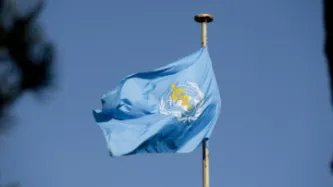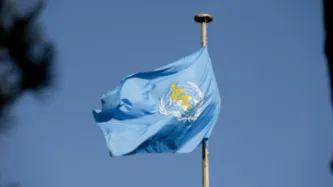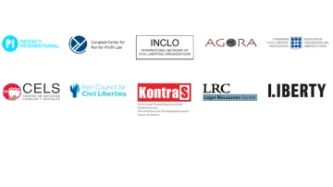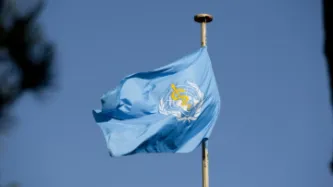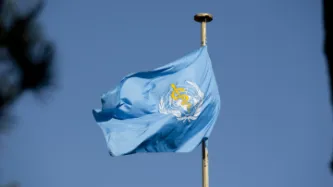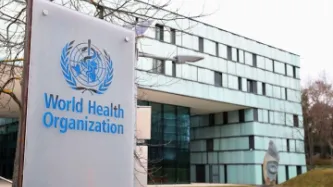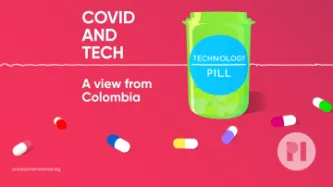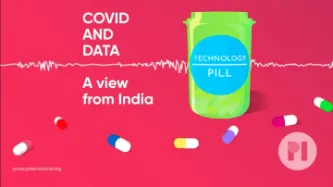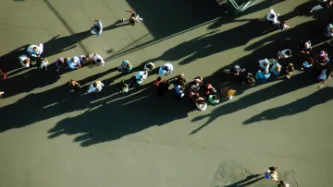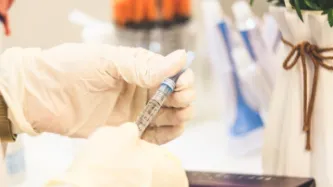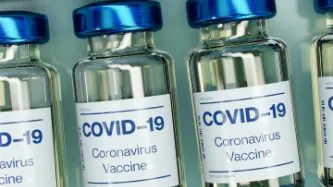Advanced Search
Content Type: Advocacy
In PI’s view the Revised Draft is a significant step back to the already weakened previous draft. Among the many concerns that we highlight in this analysis, we are particularly dismayed by the deletion of a principle on privacy, data protection and confidentiality in Article 3. In all previous drafts, the inclusion of such provision reflected the importance that data protection and privacy plays in any effective, modern public health policies. Failing to keep a specific principle on privacy…
Content Type: Advocacy
Privacy International (PI) notes the Bureau’s text of the WHO convention, agreement or other international instrument on pandemic prevention, preparedness and response (“WHO CA+”).
PI has sought to closely follow and engage with the discussions leading up to the draft treaty, despite the significant limitations to civil society participation in the process. In February 2023, we intervened during the briefing organised by the INB bureau and published our comments on the zero draft of the WHO CA…
Content Type: Advocacy
Privacy International (PI) welcomes the zero draft of the WHO convention, agreement or other international instrument on pandemic prevention, preparedness and response (“WHO CA+”). PI has sought to closely follow and engage with the discussions leading up to the draft treaty, despite the significant limitations to civil society participation in the process.
PI believes that the zero draft offers a good basis for negotiations. In particular, we welcome the inclusion of a provision on…
Content Type: Advocacy
Privacy International (PI), the European Center for Not-for-Profit Law (ECNL), International Network of Civil Liberties Organizations (INCLO), Agora, the Canadian Civil Liberties Association, Centro de Estudios Legales y Sociales in Argentina, the Irish Council for Civil Liberties, KontraS in Indonesia, the Legal Resources Center in South Africa, and Liberty in the UK welcome the opportunity to provide input to the global study of the UN Special Rapporteur on the promotion and protection of…
Content Type: Advocacy
Privacy International (PI) notes the conceptual zero draft of the WHO’s Pandemic prevention, preparedness, and response accord (“WHO CAII”). PI has sought to closely follow and engage with the discussions leading up to the draft CAII, despite the significant limitations to civil society participation in the process. In September 2022 we submitted our observations to the working draft of the WHO CAII. This analysis builds upon those observations.
Broadly, PI welcomes the content of the…
Content Type: Advocacy
Privacy International welcomes the opportunity to provide written input on the working draft of the WHO’s Pandemic prevention, preparedness, and response accord (“WHO CAII”) published on 13 July 2022.
This submission is based on our research and assessment of data-reliant and tech-intensive measures deployed by governments and companies in response to Covid-19 and its aftermath, which documented how these measures impacted people’s fundamental rights and freedoms, including the right to…
Content Type: Long Read
The global COVID-19 health crisis not only induced a public health crisis, but has led to severe social, economic and educational crises which have laid bare any pre-existing gaps in social protection policies and frameworks. Measures identified as necessary for an effective public health response such as lockdowns have impacted billions workers and people's ability to sustain their livelihood worldwide, with countries seeing unprecedented levels of applications for welfare benefits support,…
Content Type: Advocacy
In line with WHO's commitment to a human rights-based approach to health, Privacy International believes the following elements procedural and substantive elements must be included:
Open, inclusive and multi-stakeholder process
The drafting and negotiation process of this international instrument must allow for the meaningful participation of a wide range of civil society organisations (CSOs) and reflect the commitment from the WHO and Member States to receive and respond to CSOs…
Content Type: Explainer
Bluetooth
The majority of apps settled on using Bluetooth for proximity tracing.
Just what is Bluetooth?
Named after the 10th Century King Harald "Bluetooth" Gormsson who unified Scandinavia — and whose runic initials comprise the logo — Bluetooth is a wireless, low-power, and therefore short-distance, set of protocols used primarily to connect devices directly to each other in order to transfer data, such as video and audio.
Bluetooth for tracking?
Most of us who've encountered Bluetooth use…
Content Type: Video
<br />
You can find out more from Karisma here: https://web.karisma.org.co/
You can read the report here: https://web.karisma.org.co/useless-and-dangerous-a-critical-exploration-of-covid-applications-and-their-human-rights-impacts-in-colombia/
Content Type: Long Read
For over 20 years with the start of the first use of ICTs in the 1990s, we have seen a digital revolution in the health sector. The Covid-19 pandemic significantly accelerated the digitalisation of the health sector, and it illustrates how fast this uptake can be and what opportunities can emerge; but also, importantly, the risks that it involves.
As we've said many times before, whilst technologies can be part of the solution to tackle some socio-economic and political challenges facing our…
Content Type: Examples
Vaccinating a large portion of the population against COVID-19 is a critical step toward curbing the pandemic – within China and around the world. But setting population percentage targets without clear protections for people’s rights opens up the possibility of authorities abusing the quota to force jabs. And this is exactly what has played out in recent months across the country.
The Chinese government’s forced vaccination tactics, which go far beyond “mandates” being debated and discussed…
Content Type: Examples
The provincial government of Khyber Pakhtunkhwa announced that it would block the mobile phone SIM cards of people in five districts of Peshawar division which were not vaccinated by the deadline set of 31 August 2021.
Officials justified this decision following the low numbers of people coming to the 800 vaccination centres in the province despite many initiatives led by the district administrations and health department to improve Covid-19 vaccination rates.
Source: https://www.dawn.com/…
Content Type: Advocacy
On 6 August 2021, the World Health Organisation (WHO) published its technical specifications and implementation guidance for “Digital Documentation of COVID-19 Certificates: Vaccination Status” (DDCC:VS) following months of consultations. As governments around the world are deploying their own Covid-19 certificates, guidance from the global health agency was expected to set a global approach, and one that prioritises public health. As such, we would expect the WHO to identify what these…
Content Type: Examples
In January 2021, the Indian Health Ministry officially allowed Aadhaar-based authentication when creating a UHID for identification and authentication of beneficiaries for various health IT applications promoted by the Ministry. This enabled the Co-Win portal, which is used to book COVID-19 vaccination appointments, to accept Aadhaar for authentication. As per Clause 2a of Co-Win’s privacy policy, “If you choose to use Aadhaar for vaccination, you may also choose to get a Unique Health ID…
Content Type: Video
<br />
Links
You can find the Co-win vaccination website here: https://www.cowin.gov.in/
You can support PI at pvcy.org/donate and you can find out more about the Centre for Internet and Society at https://cis-india.org/
CIS also have a podcast, it’s called In flux and you can find it on all your favourite podcast apps and at https://in-flux.cis-india.org/
Like and subscribe to the podcast on which ever platform you use. It’s also available on our website at…
Content Type: Examples
It is said, better late than never. Some activists and academics, hesitantly, thought the old maxim could be applied to the Centre's micro-credit facility for street vendors – which was indisputably behindhand, in the wake of the coronavirus-triggered lockdown, announced on March 24.
But, more than a month down the line since its launch, the programme is not proving to be any beneficial either.
The majority of the eligible vendors are not able to avail the Rs. 10,000 loan, under the Pradhan…
Content Type: Examples
On 21 April 2020, it was published in the Official Gazette of Mexico City that 4,264 non-salaried workers would be granted basic economic support in a single payment to cope with the health emergency.
The Ministry of Labour and Employment Promotion (STyFE) had the possibility to launch this programme, due to the registration it has as it is in charge of granting work licenses. That is why they decided to grant it to 4,264 people with valid or pending credentials and for whom a budget of 6,396,…
Content Type: Long Read
Social protection programmes can be broadly understood as government support for individuals to meet basic human needs, protecting citizens from the “economic risks and insecurities of life”. These policies and programmes are essential to reducing the lifelong consequences of poverty and exclusion. Programmes like cash transfers – including child grants, school meals, skills development and more – help connect families with health care, nutritious food and quality education. To ensure that…
Content Type: Examples
Amid a chaotic rollout of the national vaccination plan, the Italian Federation of General Practitioners (FIMMG) and some regions in Italy are resorting to algorithms to more efficiently prioritise who gets vaccinated against COVID-19.
AlgorithmWatch documented the adoption of automated decision-making (ADM) systems to determine COVID-19 vaccination priority orders both by the Italian Federation of General Practitioners and by regional authorities in Lombardy, Valle d’Aosta, and Piedmont. More…
Content Type: News & Analysis
Earlier this week, the UK Government announced that no immigration status checks will be carried out for migrants trying to register with their GP and get vaccinated. But temporary offers of safety are not enough to undo the decades of harm caused by policies that have embedded immigration controls into public services.
Years of charging migrants for healthcare and sharing patient data with the Home Office has eroded trust between migrant communities and the NHS. As a result, they might not…
Content Type: Long Read
As we see Covid-19 vaccination programmes beginning around the world, for the first time since the start of the pandemic there seems to be a light at the end of the tunnel as the fruition of truly unrivalled global scientific efforts has given us hope of saving lives, reopening our societies, and going back to “normal”.
This great moment of hope must not be seen opportunistically as yet another data grab. The deployment of vaccines, and in particular any “immunity passport” or certificate…
Content Type: Examples
Professional sports teams are considering adopting facial recognition admissions systems to make stadiums as touchless for fans as possible as part of efforts to provide a safe environment during the pandemic. Both the Los Angeles Football Club and the New York Mets are trying the Clear app, made by Alclear, and Major League Baseball is considering it. At the LAFC, fans will use the app to take and upload a selfie to their accounts and link it to their Ticketmaster profiles; on entry to the…
Content Type: Examples
The algorithm and mathematical model used to predict students’ grades by the International Baccalaureate programme, which was forced to cancel exams because of the pandemic, incorporated three elements: coursework, teachers’ predictions of their students’ exam grades, and “school context”, which was based on historical teacher grade predictions (which universities use for provisional acceptances) and the school’s historical performance on each subject’s coursework. The result was to penalise…
Content Type: Examples
As part of efforts to make returning to campus safer, US universities are considering or implementing mandates requiring students to install exposure notification apps, quarantine enforcement programs, and other unproven new technologies, risking exacerbating existing inequalities in access to both technology and education. In some cases, such as Indiana University, UMass Amherst, and the University of New Hampshire, universities are requiring students to make a blanket commitment to install…
Content Type: Examples
A preliminary study finds that facial recognition algorithms struggle to identify people wearing masks. The study tested 89 commercial facial recognition algorithms, and the best had error rates between 5% and 50% in matching unmasked photos with photos of the same person wearing a digitally-applied mask. Masks both lowered the algorithms’ accuracy rates and raised the number of failures to process. The more of the nose is covered by the mask the lower the algorithm’s accuracy; however, error…
Content Type: Examples
Manchester-based VST Enterprises is developing a rapid COVID-19 testing kit intended to help restart stadium sporting events. The results of tests, which fans will take the day before the event they wish to attend and provide results within ten minutes, will be stored in VSTE’s V-Health Passport, a secure mobile phone app into which users enter their name, address, date of birth, phone number, and doctor information, plus a scanned official identity document against which the smartphone can…
Content Type: Examples
In early August, when the UK government announced it was purchasing 90-minute saliva-based COVID-19 tests called LamPORE and 5,000 lab-free machines to process them, supplied by DNANudge, clinical researchers were dismayed to find that there is no publicly available data about the accuracy or performance of these tests. While the tests could be a game-changer by offering rapid, on-the-spot testing with less discomfort for patients, no scientific research was offered to validate the tests, not…
Content Type: Examples
Questions have been raised about an irregular process by which the Trump administration awarded a $10.2 million dollar six-month contract to Pittsburgh-based TeleTracking Technologies. TeleTracking has traditionally sold software to help hospitals track patient status; under the new contract it is collecting key data about COVID-19 from US hospitals, bypassing the Centers for Disease Control and Prevention, to which such data is normally reported. The contract was awarded by the Department of…
